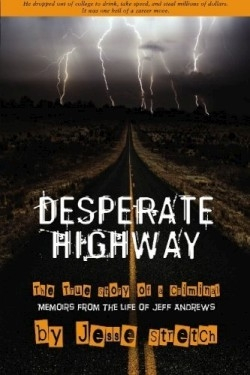Desperate Highway
The True Story of a Criminal
Desperate Highway may leave readers in disbelief. The audacity of a life lived on the criminal edge of society might boggle the mind of those readers who live the nine-to-five life, treasure their families, and pay their taxes. And the power of spiritual transformation—that such a person could be redeemed to live a moral life—must be regarded as miraculous.
While this book is labeled a memoir, it is actually memories from one man’s life recorded by a professional author. The life examined is that of Jeff Andrews, but the story begins by chronicling the adventures of a college student named Jack Alexander—unwilling to study, prone to indulgence. Alexander marries a coed with a trust fund, quits college, and moves to California. He could live off his wife’s income, but he chooses to work in retail. His journey down the “desperate highway” begins after he joins in the shady dealings of a fellow employee. “Greg was right. I need to make my own money,” Stretch writes. “I couldn’t live off a woman. It wasn’t my way. I told him to keep me posted and I’d think about how I’d get those hippies in second gear.”
This first scheme may have been unethical but not illegal; Alexander/Andrews intended to sell hippie-manufactured bean bag chairs to his employer through a shell company. But as the journey progresses, Alexander’s exploits grow bolder and more criminal, and propel him from coast-to-coast. In Hawaii he meets the woman who will eventually become his second wife, and more importantly, a link to the Colombian drug cartels.
And so it goes for two decades: schemes, dope peddling, Houston, Denver, Florida, Virginia, drugs and drink, con games, check kiting and sad women left to fend for themselves. Andrews (under aliases and stolen identities) leaves a trail of crimes interrupted by a series of incarcerations.
Readers shouldn’t expect regret. Desperate Highway is tale of bravado sailing on a river of despair. Andrews shows no empathy for the police or compassion for honest people left degraded by one scheme or another. This is the book’s most troubling aspect. Even after spiritual transformation, the focus remains on the narrator. There’s no thought for his victims: “I was out of prison, had stayed off the booze, was doing alright, but restitution was going to kill me,” Andrews says. “It would be difficult to pay it off in the time demanded by the judge…there was no way to make the payments.”
Nevertheless, this exciting chronicle of Andrews’ criminal career reads like a novel. While many of the characters are not fully drawn, crime novel fanciers will be fascinated by this real-life Elmore Leonard bad guy.
Despite its flaws, Desperate Highway provides interesting insight into the netherworld most people only read about, and a glimpse at spiritual redemption as Andrews struggles to live a productive and useful life.
Disclosure: This article is not an endorsement, but a review. The publisher of this book provided free copies of the book and paid a small fee to have their book reviewed by a professional reviewer. Foreword Reviews and Clarion Reviews make no guarantee that the publisher will receive a positive review. Foreword Magazine, Inc. is disclosing this in accordance with the Federal Trade Commission’s 16 CFR, Part 255.

